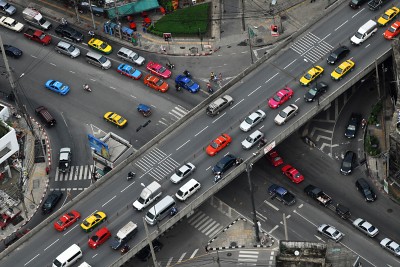Making mobility more sustainable.
by Ilaria Lonigro
 |
| Photo by think4photop, FreeDigitalPhotos.net |
“Mobility starts in the mind” is the slogan that the city of Bremen, in Germany, used to launch its own cultural revolution: a creative and smart project which combines the public network development together with car sharing and a bike-ways system. In Bremen, there are 1.8 million people and they are used to moving 3.3 times per day. Not only are there 13 train stations, 350 bus lines, underground and tram services, but people can also choose to rent a car without owning it. It's called car sharing and it allows people to forget about burdens such as insurance, taxes, parking, maintenance: the user pays only for the hours he spends driving.
“No one buys a supermarket cart to go shopping. Anyway we use it often,” explains Michael Glotz-Richter, senior advisor for sustainable mobility in Bremen. “We use it but we don't own it: what if you had one and you had to store it in your living room?” he asks. “Now think about our “urban living room” – our cities – and about how we use that space." Studies, says Glotz-Richter, have shown that, on average, most cars are parked for 23 hours a day. "Do we really want to use so much valuable space for storing vehicles?” he asks.
The Free Hanseatic City promotes the use of bicycles too. More than a half of car rides aren't longer than 6 km: why not doing the same trip by bike? Bike-ways have been developed throughout the city centre. Besides, in some areas of Bremen the maximum speed limit for cars is 30 km/h. Thanks to this smart policy, nowadays a quarter of the total trips in Bremen are made by bicycle.
Of course, such a cultural revolution needs a supportive and massive campaign to inform citizens and to affect their choices. Children at school are taught to move on feet or by bike; citizens receive maps of all the public lines by mail and finally, tickets for concerts and sports usually include bus, underground, tram and car rides to reach the location of the event. This avoids congestion and parking problems. These good practices in the field of sustainable mobility are the reason why Bremen was selected at the Shangai World Expo 2010 Better city, Better life.
Thanks to the Bremen example, today many other cities, not only in Europe, are greening up in the name of sustainability. From Bucharest to Turin, more and more people choose to use the same car (car sharing) in different moments. Others prefer travelling together to the same place: as in the case of car pooling, a sort of organised hitching which involves also destinations abroad. In Germany around 200.000 people take part in car sharing and it's getting more and more popular all over the world. The potential is tremendous: every shared car has the same footprint of six private cars. Every city that adopts car sharing practices avoids 160 tonnes of CO2 and 1.5 tonnes of PM per year and it gains about 50 000 mq of free space that was once occupied by unused parked cars.
According to a study by Zipcar, a leader American society of car sharing, 37 million people in 75 big cities around the world could be involved in car sharing and the owner of the services could make 10 billion dollars out of it. Today there are more than 1000 cities in four continents that have a car sharing service and more than half a million users take advantage of it. Still the number of smart movers is low. What is holding people back? Mostly it a psychological barrier, as the French Club 'Innovations Transports des Collectivités' reveals. But recession might push millions of people into this cultural revolution born in the middle of Europe.
According to a study by Zipcar, a leader American society of car sharing, 37 million people in 75 big cities around the world could be involved in car sharing and the owner of the services could make 10 billion dollars out of it. Today there are more than 1000 cities in four continents that have a car sharing service and more than half a million users take advantage of it. Still the number of smart movers is low. What is holding people back? Mostly it a psychological barrier, as the French Club 'Innovations Transports des Collectivités' reveals. But recession might push millions of people into this cultural revolution born in the middle of Europe.

No comments:
Post a Comment